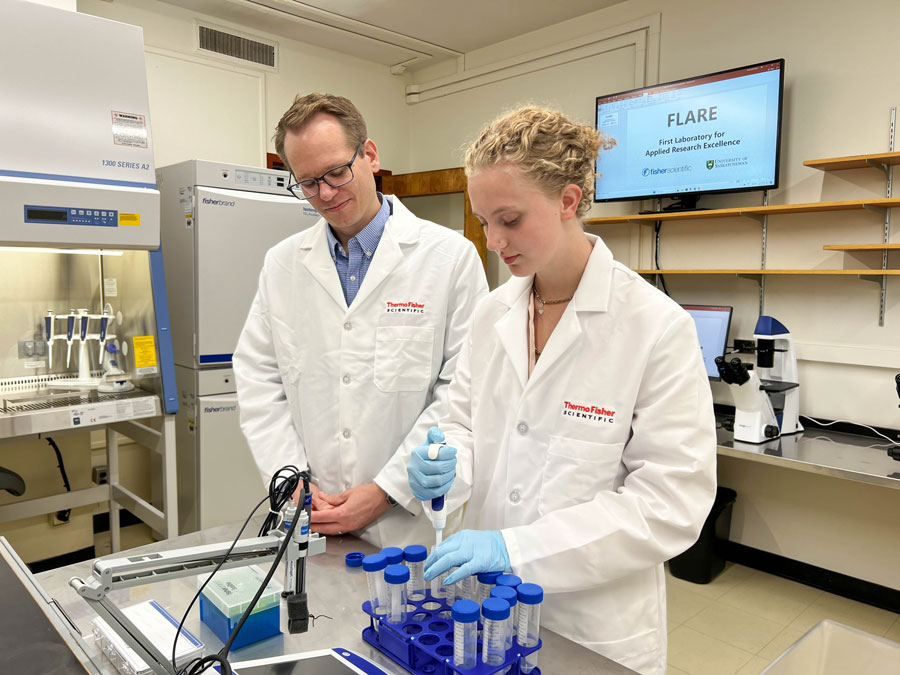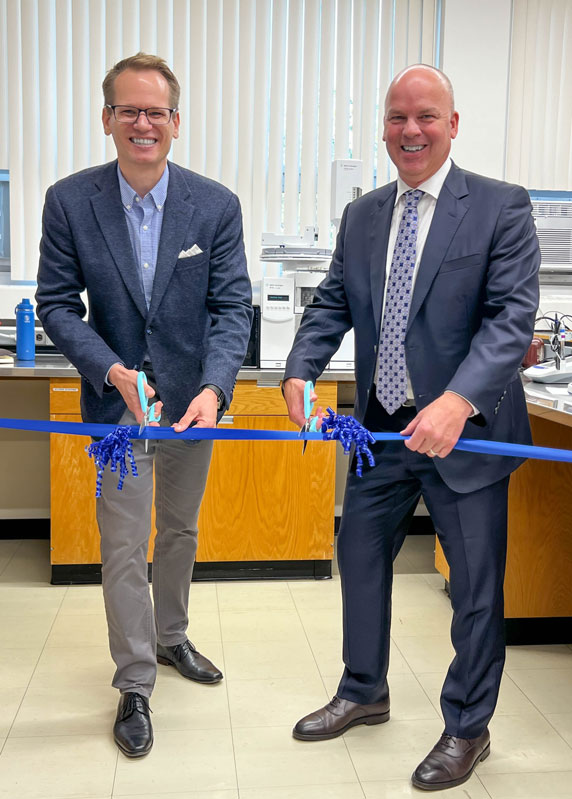
Fisher Scientific donates $150,000 in equipment and supplies to new Toxicology Centre lab
Thanks to the generous support of donors and an in-kind gift from Fisher Scientific, the University of Saskatchewan (USask) Toxicology Centre now has a newly renovated lab space that will enhance interdisciplinary research and benefit students from a range of academic units across campus.
By Sarah Trefiak
Fisher Scientific recently provided the Toxicology Centre an in-kind gift of Fisher brand and Thermo Fisher Scientific equipment and supplies worth $150,000. That gift, combined with $100,000 in donor funds which were directed to the Critical Research pillar of the Be What the World Needs campaign, made it possible for the centre to unveil a newly renovated laboratory in early September.
The new lab space, named the First Laboratory for Applied Research Excellence, or FLARE, will provide students the opportunity to access high-calibre research equipment earlier in their education with a new second-year toxicology laboratory course set to launch this winter. The course will be the first toxicology-centred laboratory experience for USask undergraduate students, enabling them to acquire crucial practical skills and opportunities for learning foundational techniques such as toxicity tests with invertebrates and fish embryos, biochemical tests, analytical chemistry as well as experiments with cell cultures.
Dr. Markus Brinkmann (PhD), director of the Toxicology Centre, said while offering a course of this nature has always been a keen interest of the centre’s faculty, the infrastructure for toxicology-specific experiential learning, including toxicology lab courses, did not exist prior to the opening of the new lab.
“Our new laboratory will reach a broad audience—from elementary students to university students to working professionals—and combined with our interdisciplinary programs, the space will allow us to train world-class toxicologists who are highly sought after to address current and emerging human and environmental health issues,” said Brinkmann, citing chemical risk assessment, environmental monitoring and forensics, as well as the safety testing of water, foods, and feeds, as just a few examples of the critical research toxicologists contribute to.
With a location in Saskatoon, Sask., Fisher Scientific is a leading laboratory supply company offering over 2.5 million products and extensive support services to the research, production, healthcare, and science education markets around the world.
“Thermo Fisher Scientific is pleased to partner with USask and the Toxicology Centre to help create this multi-dimensional scientific learning centre,” said Cory Johnston, vice president sales and country lead (Canada) at Fisher Scientific. “Our mission is to enable our customers to make the world healthier, cleaner and safer, and we’re proud to support this great program.”
Fourth-year toxicology student Alicia Lamb, who has also served as an employee and volunteer with the Toxicology Centre, said the material support from Fisher Scientific and the financial support from individual donors means that the centre can provide top quality education to shape future scientists and support students in their curiosity.
“Lab work is such a strong component of the new information developing in this field and interpretation of this information is critical to a student of toxicology,” said Lamb. “I am so happy that future students will have the opportunity to participate in a practical teaching lab, to have hands-on experience early in their degree and bolster their abilities as toxicologists.”
In addition to the new undergraduate toxicology laboratory class, several other initiatives will benefit from, or be made possible by, this new laboratory space, including a toxicology techniques class as part of the interdisciplinary toxicology graduate program; ad hoc elementary and high school tours and activities; toxicology summer camps; and ad hoc workshops and tours for working professionals, including the offering of cell culture bootcamps.
Together we will create inspired places for people to address the challenges of the future. We invite you to join by supporting visionary spaces at USask.

